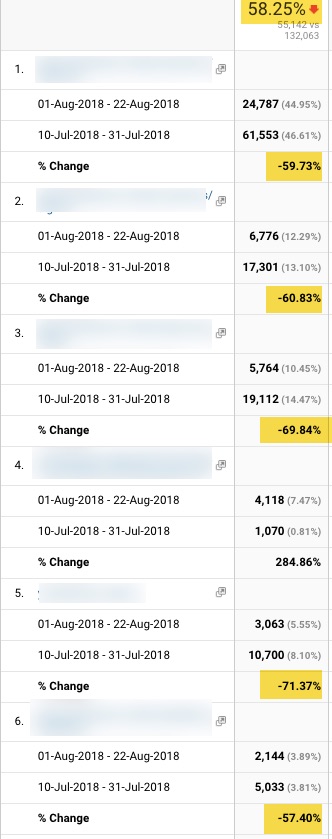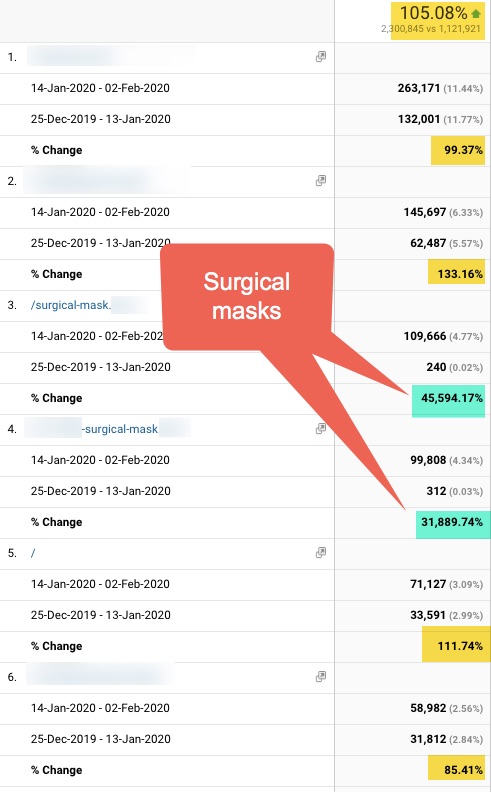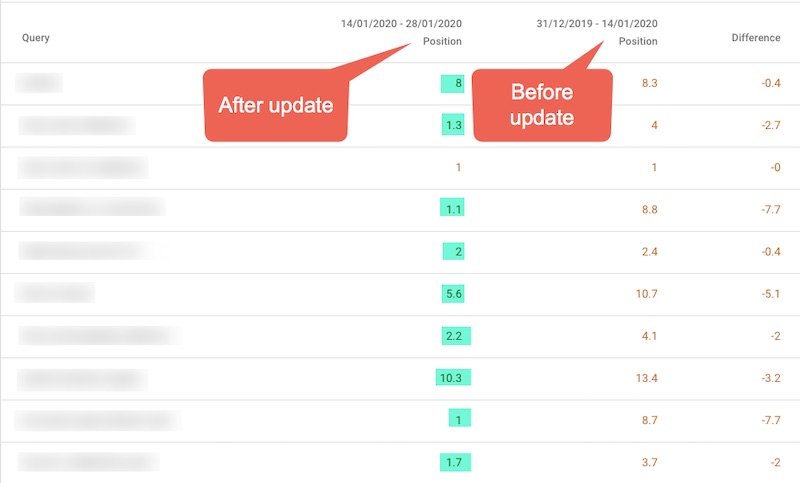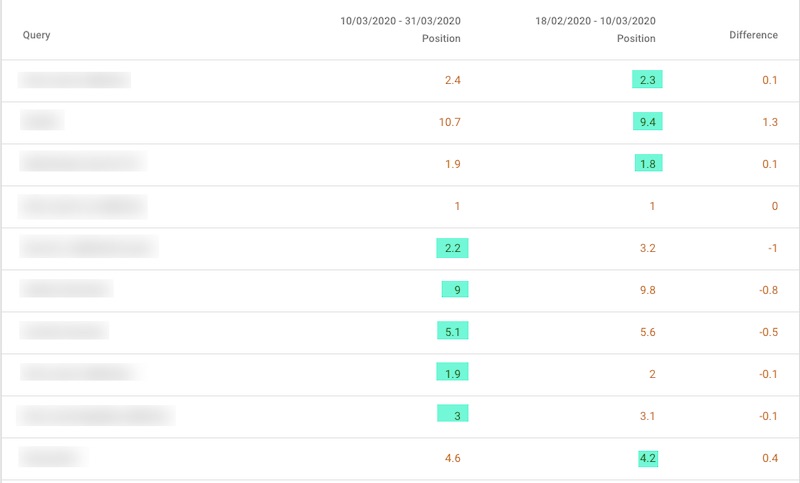Once again, Google has announced that another core update is underway. We had hoped that Google would hold off on releasing a significant update in the midst of the turmoil that is affecting the world right now with so many people affected by COVID-19. However, we understand that if Google has changes they can make that would give us search results that are better, safer, and more helpful than before, it makes sense to push those changes live.
Were you affected by the May 2020 core update? You can find more information on our thoughts on this update by signing up for MHC’s Search News You Can Use SEO newsletter. We now have a full article out on the May 2020 core update.
One of the reasons why we had hoped Google would wait before pushing out a big update, is that for many sites, diagnosing the cause for a drop in traffic can be quite tricky at the best of times. And now, a vast number of websites are down in traffic due to mass social distancing and businesses closing. Other businesses are seeing atypical increases in traffic if they sell face masks, hand sanitizer, or other products or services that are in high demand due to the effects of the virus.
In this post, we will give you several tips to help you make sense of your data during this challenging time.
Is there a drop in Google organic traffic?
If your site has experienced a traffic drop, in order for us to determine if the drop was caused by changes that Google made to their algorithms, it makes sense that we should be analyzing solely Google organic traffic. If you are not sure how to do that, you can read this article on how to look at Google organic traffic.
Below, we have shown all traffic that Google Analytics has recorded for a past client of ours. This site came to us saying that they had seen a massive decline in Google traffic following the June 3, 2019 Google update. Looking at all sources of traffic, it really doesn’t look like there was any sort of significant drop.
However, this site has many different referral sources that provide them with traffic. They get a lot of visitors as a result of social sharing and email marketing.
When we look at only Google organic traffic, we see a much different picture for this site. It is quite obvious that the site was negatively affected by the June 3 Google core update.
Knowing which Google updates have strongly impacted a site can give us many clues as to what it is that Google could be considering as lower quality on the site. In our post on known and suspected Google algorithm updates, you will see our observations on the types of site issues that we feel were addressed with each Google update. For the site above, the drop with the June 3 update was very clearly related to some significant trust issues as this site will often publish information that is seen by many to be contradicting popularly believed medical scientific consensus. Recovery will be challenging for this company unless they completely change their business model. Still, looking at Google organic traffic gave us important information that we could not see by looking at data coming from all traffic sources.
Did other traffic sources decline as well?
If your site traffic drops in conjunction with a Google update, this usually means that you have been affected by the update. But, coincidences do happen. We have had several cases where a client has come to us saying that their traffic dropped during a Google update, when in reality traffic dropped across many different sources and the cause was not likely to be due to changes in Google’s algorithms.
In one case, the site had launched a redesign. Later that day, Google announced that they had pushed out an update to the Panda algorithm. When the site saw drops in traffic following that update, they assumed that they had been negatively affected by Panda. However, the 30% drop in Google organic traffic was mirrored in Bing organic traffic as well as Yahoo.
Their new redesign had inadvertently stripped out the majority of internal links and introduced several issues that impacted SEO. As such, this drop was likely not due to Panda, but due to site changes that were made.
Are the traffic changes seen relatively equally across all pages?
In our experience, in most cases when a site is impacted by a Google update, the impact, whether positive or negative, is seen across the entire site. Sometimes, the update can affect just certain sections of a site such as its blog or shop, but usually a core update will impact the majority of pages on a site.
To check this in Google Analytics, you can look at traffic before and after the drop. Here is a client who came to us after being negatively impacted by several updates including Google’s Medic update in August of 2018. It is quite obvious to see that there was a significant drop in traffic following this update:
Note: This site was a joy for us to work with. We helped them to improve many aspects of quality and they saw a very nice boost in Google rankings with the January 2020 core update. The spike and fall in traffic you can see at the end of this chart is related to a vast increase in searches connected to Coronavirus.
To determine if this drop affected most pages on the site, we do the following:
1) Go to Behavior → Site Content → All pages
2) Set the date to show us a 2-3 week period after the update as compared to the same period before the update.
3) Compare pages
With the exception of one newly published page that was doing well on social media, we can see that the drop of approximately 60% in traffic was consistent across most of the site.
This is typical of what we see with most sites that are negatively affected by a core update.
Contrast this to a site that is seeing spikes in traffic during the global pandemic. This site implemented many of our recommendations for improving site quality. We were thrilled to see that following the January 2020 core update they saw huge gains in organic traffic:
The comparisons of how each page performed for this site are very interesting. We can see that across the site, most pages saw approximately a 100% increase in organic traffic following Google’s reassessment of the site’s previous quality issues. But some pages saw absolutely massive changes.
In this case, we feel that two things happened. The site saw positive benefits after the Google core update AND the site was experiencing a massive increase in sales of supplies related to COVID-19. Most likely the two of these were connected. As Google’s assessment of site quality improved, the site was able to jump into a higher ranking position for several queries related to protective surgical masks.
Have keyword rankings changed?
Keyword rankings change on a regular basis. A drop in rankings for one or two keywords is usually not indicative of a Google algorithm update hit. In our experience, if keyword rankings have dropped across the board, and if those drops happen within 24-48 hours of a Google update, it is quite likely that the update is to blame.
There are many great keyword tracking tools out there. In our analysis we make good use of data from SEMrush and Ahrefs. If you are not a paid member of these tools their use can be a little limited. However, you can also get excellent data for your own site from Google Search Console.
To determine in GSC whether you have seen a drop in keyword rankings across the board, you can go to the Performance report and once again, compare a two to three week period after the potential update to before. What we are trying to determine is whether all keywords have changed in rankings, or whether just those that are connected to coronavirus are. Or, in the case of many sites, you may see that keyword rankings haven’t really changed significantly, but traffic patterns have.
Here is a client of ours whom we are working with to help after they suffered a catastrophic drop following the June 3 core update. While they are not completely back to the levels they had before, they’re getting there! This site has been working on a great number of quality issues including writing content to be more in line with scientific consensus.
The GSC data shows us that the site very clearly saw a drop in conjunction with the June 3 update and a nice partial recovery with the January core update. But what is happening during the time of pandemic panic?
If we compare GSC ranking data before and after the January update, it appears that most keyword rankings have seen improvements.
But now, let’s look at the keyword rankings before and after March 10, 2020 (marked as COVID-19 on the image above). You can see that some keywords are up slightly and some are down slightly, but really, there is no obvious significant widespread drop or improvement in rankings.
If there is no drop in rankings, why did traffic decline so much after March 10, 2020? We saw this same pattern in the majority of sites that we have analyzed. This pattern is quite typical:
For each of these sites, however, we can see a similar pattern of traffic loss in Bing. This makes a March 10 Google update much less likely to be the cause of the loss of traffic.
If your traffic declined starting on March 10, 2020, it is very likely that the drop is due to a change in people’s search patterns. March 10 was the date on which the WHO declared coronavirus a pandemic, the US stopped all incoming flights from Europe, and the NBA became the first sports organization to suspend their season because of the virus. The world’s search habits changed drastically at this time.
Conclusions
It can often be quite difficult to determine whether a site has been affected by a Google core update. This task can be even more challenging in the midst of an event that impacts how the world searches. What we are experiencing right now with social distancing, closed businesses and widespread serious illness, is unprecedented.
If you are not sure whether you have been negatively affected by a Google update, we hope that this post has helped you make sense of your data. If you are interested in having an MHC site auditor dig into your analytics, please do reach out to us.
What should you do if you have been negatively affected by a Google update?
Recovery from a Google core update hit is possible for many businesses, but not all. In our experience, if you are a legitimate, trusted business, you absolutely can recover after a Google hit. However, if your past rankings were relying on any of the following, recovery can be challenging if not impossible:
- Paid links
- Self-made links such as guest posts, or easy to obtain links such as roundups or reciprocal link schemes
- Content that is essentially copied from other sources without adding significant value
- Content that relies on some level of deception in order to be accepted by searchers - An example would be a site that advertises a free product, but in reality collects credit card info and charges their users
But, if you are a good website with content that people truly do find valuable and helpful, there are many different things that can be done to improve the quality of this content. Here is our recommended reading for every site owner who has seen a drop in traffic following a Google update:
Google’s blog post on Core updates - In this article, Google tells us of the importance of E-A-T. They also provide a bulleted list of many things you can ask yourself to help determine if you have quality issues.
The Quality Raters’ Guidelines - Required reading for all SEOs. These guidelines contain pages and pages of examples of what Google considers high or low quality. They are a little long to read, but well worth it. If you would rather read a condensed version, the MHC team has created a document that we use as a checklist as our baseline to assess websites for quality. It is available for purchase here.
Our document on E-A-T - There is an incredible amount of information to learn about what Google has said on how they value Expertise, Authoritativeness and Trustworthiness. This is a massive article that summarizes almost everything Google has said on the subject.
Our blog - We mostly write about Google updates, site quality and link quality. Our blog is loaded with information on how to improve site quality and also assess traffic drop issues.
The MHC Search News You Can Use Newsletter and Marie’s Podcast - It takes all ten of us to produce this weekly beast of SEO news! In the free version, we share news on Google announcements and updates. In the premium version, which at the time of writing this is $18 USD per month, we go into even greater detail. When there is a Google update, our premium subscribers are the first to hear Marie and the MHC team’s thoughts on what Google is rewarding, and what you can do to improve your site so that it is more likely to come out on the right side of each update.
If you are interested in having an MHC team member audit your website and give you a list of improvements you can make to help improve your E-A-T and overall site quality, you can contact us here.
Questions?
Are you still struggling to determine whether your traffic changes are due to a Google update or COVID-19? Leave a comment below and we will do our best to give our thoughts.
















Comments
Dear Dr. Marie, thanks a lot for such valuable information. You opened my eyes on new aspects of seo, i didnt know before, appreciate. Just curious, why this article for example, doesnt follow Your url pattern, mariehaynes dot com slash blog slash were-you-affected… Godbless!
Great article as usual! I appreciate your detailed and helpful article.
Have you seen any meaningful recovery from the medic update? I am yet to see a site that has been recovered.
I’ve analyzed hundreds of sites and from what I’ve seen the all of them (almost) vanished. It looks like the majority of the traffic went to the trio: Healthline, Medical News Today, and some traffic to Mayo Clinic.
I’ve also noticed that both HealthLine and Medical News Today were purchased by Summit Partners just 2 years before the Medic update for $95 million. They really knew what they were doing as the traffic exploded after the medic update.
Interestingly I’ve also noticed a recent cooperation between google and Helathline “News Release: Google, PIH Health Good Samaritan Hospital, Norwest Venture Partners Are First to Sign Up for Free Coronavirus Daily Update From Healthline.com”
Interestingly in July 2019 – Red Ventures (a multi-billion dollar company) purchased Healthjline Media from summit partners.
This all chain of events in the context of medic update seems very interesting indeed. These (mega) companies really know their work.
Interesting points David.
We’ve helped quite a few sites make full or partial recoveries from Medic. In some cases, working on improving online reputation issues appears to have helped. In others, it has taken extensive work and budget to build up brand authority to the point where Google’s algorithms treat the site as an authoritative YMYL site.
There is no major change in my website after this core update but our business is big-time affected by COVID 19 as we deal in Entertainment industry majorly amusement parks, movies etc. Let’s see how much time it takes to recover.
Thanks for the informative piece, Marie.
Agreed, In this COVID-19 situation my traffic slightly decreases by 20-30%.
Its due to deliveries are closed no-one is buying stuffs so no search.
Hope this will end soon and we start seeing improvement in business.